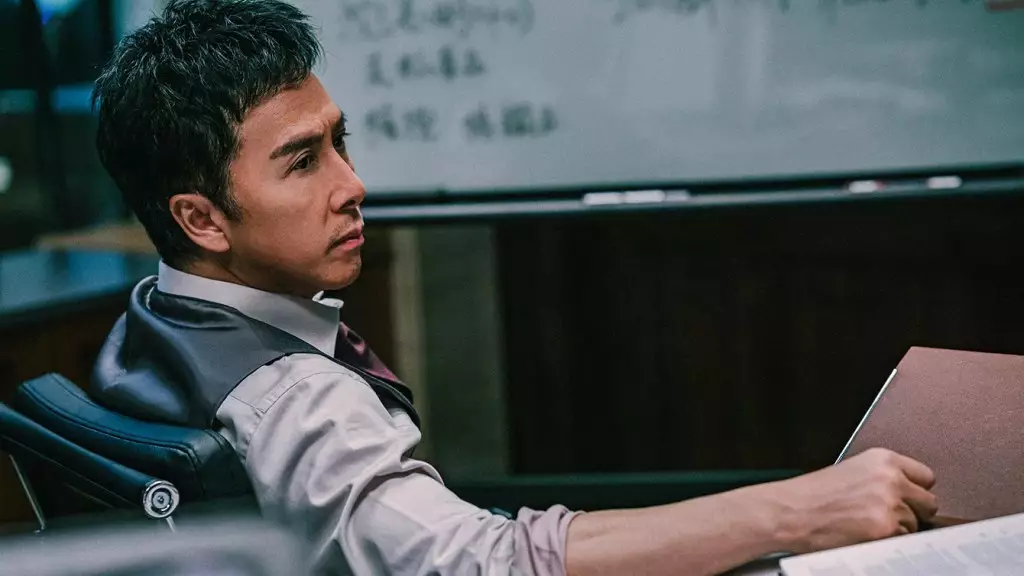Donnie Yen’s latest venture, “The Prosecutor,” situated at the crossroads of action and legal drama, presents him in a dual role as both director and lead actor. The narrative hinges on the ethical dilemmas faced by a dedicated prosecutor who transitions from traditional law enforcement to the Department of Justice, motivated by a profound sense of duty. However, the film’s ambition to meld intense action with serious courtroom drama is a double-edged sword, revealing strengths and weaknesses in its execution.
At first glance, “The Prosecutor” appears to leverage Yen’s formidable action pedigree, ensuring that adrenaline-driven sequences would dominate the experience. Yet, the film attempts to coalesce this action with an in-depth dissection of the legal framework governing Hong Kong. While this thematic blend could have carved a unique niche in cinema, the focus on procedural law often feels overwhelming. For audiences yearning for action, it may seem like a retreat from the high-kicking personas they anticipate from Yen. Rather than a relentless exploration of moral ambiguity through fists and footwork, the film instead provides a heavier emphasis on legal intricacies.
Through the character of Fok Chi Ho, portrayed by Yen himself, the film aspires to present a hero who embodies the virtues of justice and compassion, reminiscent of traditional action heroes. However, this character’s journey towards enlightenment is punctuated with static moments that may not resonate as thrilling. The film’s slow pacing—like a courtroom’s tedious deliberations—can create disillusionment among viewers looking for the fast-paced choreography typically associated with Yen.
The screenplay, penned by Edmond Wong, wades through various procedural dramas with a multitude of legal terminologies and frameworks. The character interactions reflect a system under strain, where Fok finds himself often at odds with peers who prioritize expediency over truth. This backdrop effectively underscores a critical portrayal of the justice system—a commentary that, while ambitious, becomes dense at times. Indeed, even those familiar with Cantonese may struggle to keep up with the rapid-fire legal jargon presented via subtitles.
Further complicating matters is the portrayal of supporting characters, like Mr. Yueng (Francis Ng) and the enigmatic lawyer Au Pak Man (Julian Cheung). These figures present foil dynamics to Fok’s unwavering principles but lack the depth that could have made their conflicts more compelling. The script’s abundance of legal detail transforms complex human stories into a barrage of information, stifling the emotional engagement that audiences crave.
One of the film’s more surprising and engaging elements is its reflection on contemporary Hong Kong societal issues, particularly in the context of recent legal changes such as the National Security Law. Although the film does not overtly address these matters, the underlying significance is impossible to overlook. “The Prosecutor” becomes an unintentional commentary on the fragility of legality in a society grappling with new constraints. In a way, this subtle probing of political realities elevates the film beyond a mere crime saga into a piece of cultural critique, positioning the notion of justice as increasingly tenuous.
The climactic sequences blend courtroom determination with physical confrontation—something clealy meant to align with Yen’s established strengths in action. However, the movie’s late-hour fight scenes, especially one set on a subway train, feel somewhat shoehorned in; a concession to Yen’s action-centric fans. The choreography is undeniably exhilarating, yet the perceived delay in action diminishes its impact, reinforcing the sentiment that the film didn’t lean into its core strengths when it had the opportunity.
“The Prosecutor” finds itself in a precarious position. While Yen’s intense desire to expand his artistic repertoire is commendable, the fusion of action and legal drama proves to be a convoluted endeavor. The film often succumbs to its own ambition, drowning in a tide of legalistic jargon while struggling to provide the kind of visceral experience his fans have come to expect. As Yen explores the depth of character and societal issues, audiences may question whether this ambitious step is a long-term strategic evolution in his career or merely a momentary departure from the action they adore.
In the final analysis, “The Prosecutor” may serve more as a testament to the importance of justice rather than a celebration of martial prowess, leaving its audience with challenges echoing far beyond the screen. It is, indeed, a complex reflection on moral integrity and societal duty, cloaked in the guise of a courtroom thriller. While some may find it refreshingly different, many may await Yen’s return to pure action, as the title suggests that in the pursuit of justice, the personal cost may stretch far beyond initial expectations.
